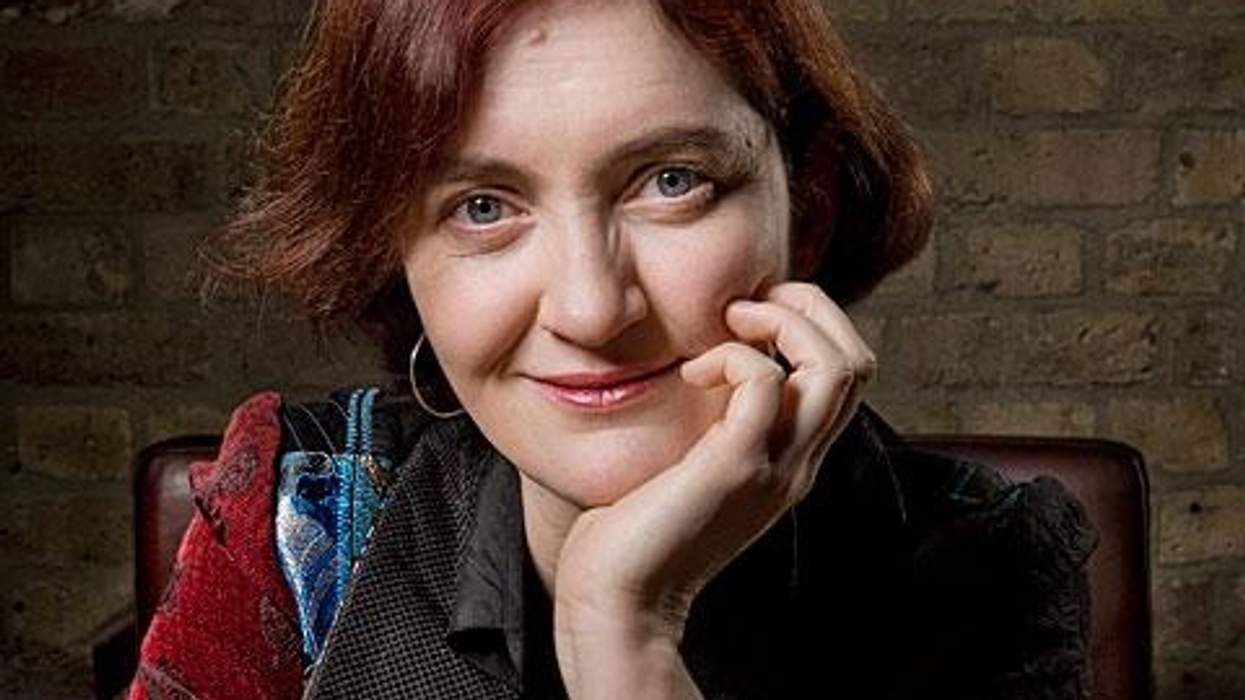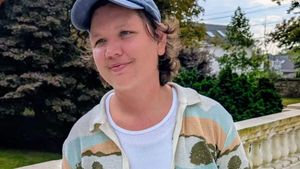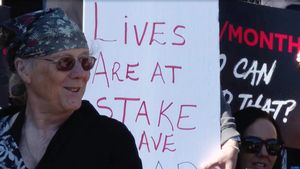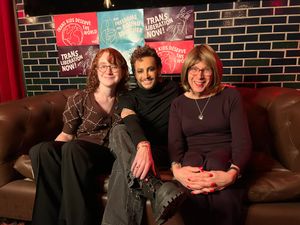Jenny Bonnet, the captivating catalyst in Emma Donoghue’s terrific new novel, Frog Music, would make any literature-lover’s list of most unforgettable characters.
Living independently and peripatetically in 1870s San Francisco, making her living by catching frogs, pilfering whatever she needs without a second thought, wearing men’s clothes even though doing so gets her arrested, and falling victim to a mysterious killer’s bullet at age 27, Jenny is a character you couldn’t make up — and Donoghue didn’t have to.
She discovered Jenny while reading a nonfiction book about unconventional 19th-century women, Wild Women: Crusaders, Curmudgeons, and Completely Corsetless Ladies in the Otherwise Virtuous Victorian Era by Autumn Stephens. This put Donoghue on a quest to learn more about Jenny, her friend Blanche Beunon, the other people in their lives, and the world they inhabited. “I went down this big sort of rabbit hole of research,” says Donoghue by phone from her book tour.
She knew Jenny was murdered during the brutally hot summer of 1876 at a ramshackle inn at San Miguel Station, on the outskirts of San Francisco. She knew Jenny caught frogs and sold them to restaurants, as frogs’ legs were considered quite the delicacy. She knew Jenny was friendly with Blanche, who worked as a burlesque dancer and prostitute, and was, like Jenny, an immigrant from France. But many accounts were incomplete or inaccurate, with journalists making up details to fill holes in their stories. So Donoghue had to embark on “a lot of patient research” to ascertain the facts of the case and then use her ample imagination to flesh out the story. She didn’t mind, though. “I just love this kind of research,” she says — which is lucky for her and readers.
Frog Music is something of a departure for Donoghue, whose last novel was the acclaimed Room, about a mother and son held captive in the titular space. The Dublin-born Donoghue, who now lives in Canada with her partner and children, has a varied body of work, and some of her novels have had elements of crime, but she’d never attempted a full-on murder mystery. She has great respect for the genre, she says, and she was aware she had to give readers some resolution. “I really tried to honor that bargain,” she says.
To say Jenny is murdered is not a spoiler — it’s revealed in the novel’s first chapter. But then flashbacks chronicle the month leading up to her death, alternating with scenes of Blanche seeking to bring Jenny’s killer to justice, track down her own missing son, and generally find a way to survive. Donoghue never gives too much away at once, instead peeling back layers of the story and divulging just enough to whet readers’ appetite for more. And she does offer resolution.
In addition to portraying fascinating characters involved in a mystery, Frog Music offers a detailed depiction of an era, one in which it wasn’t easy to be a woman. Blanche thinks she’s doing just fine; thanks to her earnings from doing “leg shows” and selling her body to a few select clients, she owns an apartment building in Chinatown and supports her lover, Arthur Deneve, and his friend Ernest Girard as the two men spend their days drinking and gambling. (The three had been circus performers in France until an accident ended Arthur’s career as a daring young man on the flying trapeze.) Her income also enables her to pay the fee to the so-called farm where her infant son is lodged. But the novel makes clear that Blanche’s supposed security is built on a shaky foundation. “The fragility of women’s economic status in those days was something I really wanted to emphasize,” Donoghue says.
Blanche is more the protagonist of Frog Music than Jenny, although it’s Jenny who drives the action. Originally, Donoghue intended to recount the story from both women’s point of view, but as she proceeded, it worked out better for Blanche, the more straightforward character, to tell the tale, and let Jenny remain enigmatic, she says.
While Jenny may be an enigma — as well as a rogue and a provocateur — she’s a beguiling one. Her mode of dress, while unconventional and illegal, isn’t an attempt to pass as male; she merely says, punning, “It suits me.” She’s often spouting witticisms, always prefaced with “As the fellow said,” or breaking into snatches of song. She urges Blanche to leave the sex trade and her worthless lover and possibly set up her own business, perhaps a dance academy, and to reclaim her son. She sleeps where she falls and thinks nothing of appropriating someone else’s expensive bicycle. She’s evasive about her past and may not have always been as independent as she currently appears.
“I think she’s got an extraordinarily modern sensibility for 1870s San Francisco,” Donoghue says.
Blanche is an appealing character too, and Donoghue says she intended for readers to relate to Blanche’s difficulties, which they undoubtedly will. She notes that Blanche is a marked contrast to the devoted mother of Room, as she’s casually relinquished her child — yet eventually decides she wants him, notes the author, adding that she was intrigued by “the idea of this baby as unwanted and [then] suddenly passionately wanted.”
Children are important in Donoghue’s life; she and partner Chris Roulston have a son, Finn, age 10, and a daughter, Una, 6. Roulston is a professor of women’s studies and French at the University of Western Ontario. Roulston’s mother, Claude Gillard, is a translator who provided invaluable help with the many 1870s-era French expressions used in Frog Music, Donoghue notes.
Donoghue is the youngest of eight children of literary parents — her father, Denis, is a distinguished literary critic who’s recently published a new book, and her mother, Frances, is a teacher of English and history. Both helped inspire her to write, but she’s the only one of their offspring who’s caught that bug.
Her current projects include adapting Room into a screenplay, with Irish filmmaker Lenny Abrahamson set to direct. She’s enjoying the process and says she’d be interested in adapting Frog Music into a movie as well. Also, she’s working on a children’s book, her first. “It’s great to challenge yourself and ask new things of yourself,” she says.
Frog Music is out now; buy at your favorite bookstore or order here. To learn more about Donoghue and find out where she’s reading and signing the book, visit EmmaDonoghue.com.























































































 Cindy Ord/Getty Images
Cindy Ord/Getty Images























